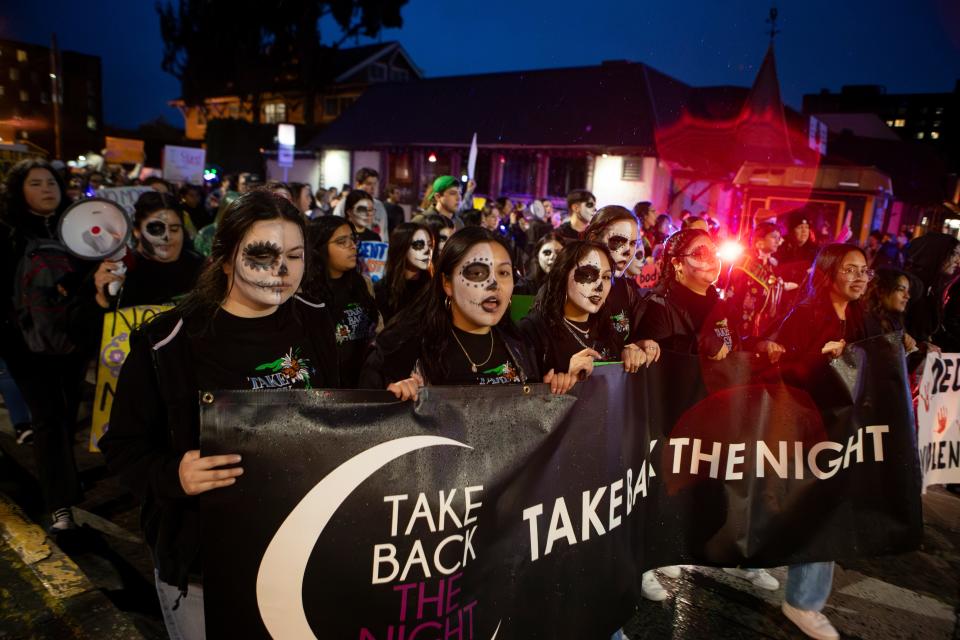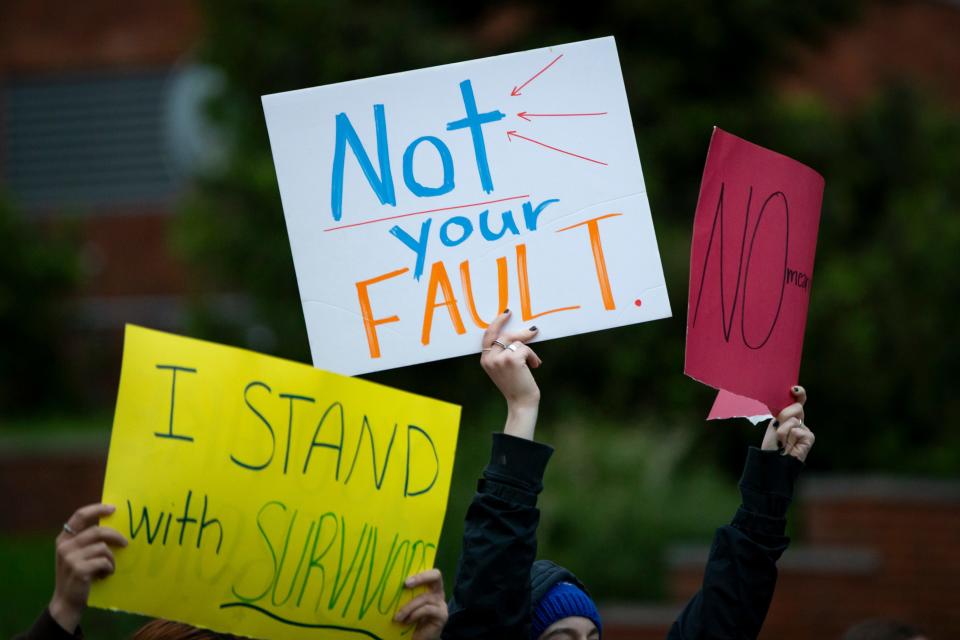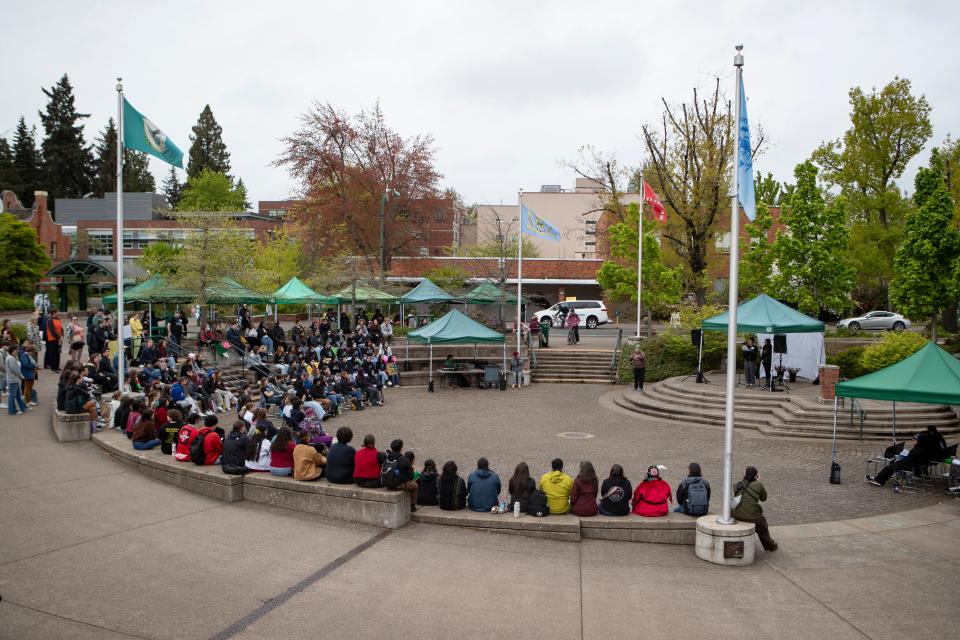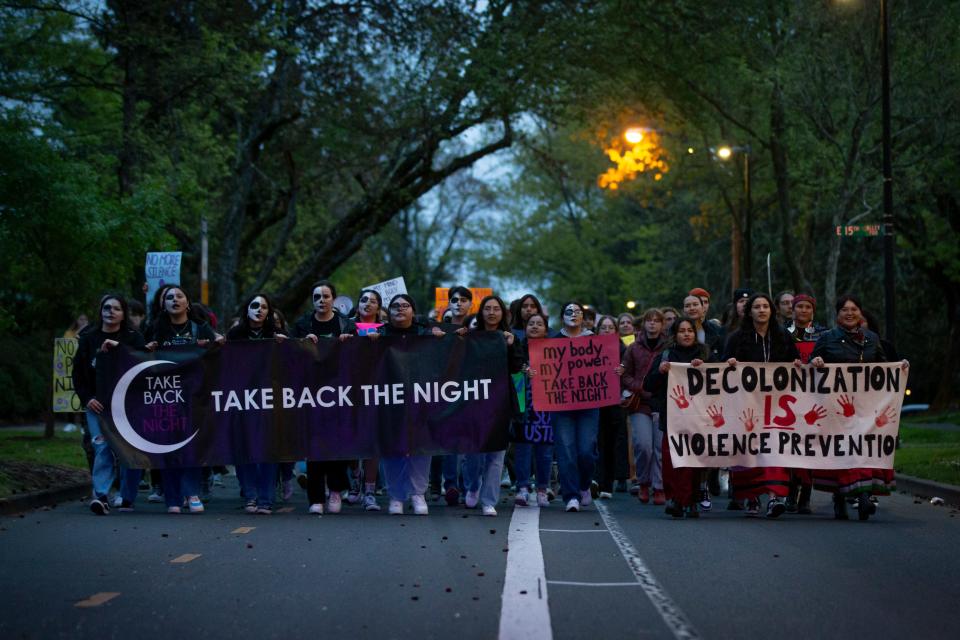'People unite, Take Back the Night': Dozens share their experience with sexual assault
Through the streets of downtown Eugene, between apartments and Greek housing, hundreds chanted in unison on Thursday night, calling for the end of sexual and domestic violence.
Marchers with the 46th annual Take Back the Night waved signs and cheered as they continued on their two-and-a-half-mile route. As the crowd passed by buildings, people could be seen hanging out of apartment windows, whistling and screaming in support. Sorority sisters gathered on balconies, waving to the marchers. Some came out to the sidewalk and applauded the group as it passed by.

Take Back the Night is a global movement, meant as an opportunity for survivors and allies to find unity, and solidarity and to stand against sexual and domestic violence. It started as a way to raise awareness of the realities of sexual violence against women. The University of Oregon's Women's Center has been putting on the event annually since 1976.
Despite the rainy night, over 200 people attended Thursday's rally, march and Speak Out events.

The groups prepared dozens of chants, "No more silence, no more lies. We will not be victimized," "Aquí estamos y no nos vamos" (Here we are and we aren't leaving.), "Forced consent is not consent."
"People united will never be divided"
For Kelly Barber, this was her first time attending UO's TBTN event. She was one of eight speakers who shared their stories at the rally.
Barber, a sophomore at UO, was encouraged to speak by one of her sorority sisters in Zeta Phi Beta, a historically Black sorority. As a survivor of domestic violence in a queer relationship, Barber said it was important for her to share her story, publicly, for the first time. Barber said the university has played a significant role in her healing journey, having started therapy and now being diagnosed with PTSD.
"This is just like another step where I'm able to be an advocate, especially for LGBTQ+ Black people," Barber said. "Black people are just a small population on campus, and then add in being queer, it's even less (of a) population. I'm glad I can be able to speak out on this, especially since I'm in a very marginalized community on campus."

For Meghna Jain, an international student from India, this was her third year in a row speaking at the TBTN rally.
Jain spoke about global issues that face women, particularly in India, where parts of the country are heavily censored. She described a recent event where two women were paraded naked through the streets, and then sexually assaulted on camera. That video was taken down, by means to erase the situation, according to Jain.
She said she wants to bring these atrocities to the forefront of people's minds.
The Women's Center has been a huge part of Jain's UO experience. She has worked at the center since she came to UO. Coming to a predominantly white institute as an international student and woman of color was a big change for her.
"In all honesty, I think if the Women's Center was not there, I would probably have been back home by now," Jain said. "Women's Center has definitely been like a major part in just getting to know Eugene, and just feeling less alone."
'This is what community looks like'
During the rally speeches, speakers talked about reproductive rights, global violence, child abuse and other topics.
"(TBTN is) just for every one of those who identify as survivors, and those who want to show up and show out," said Fatime Roohi Pervais, director of the UO Women's Center. "To let survivors know that they believe them and they support them, and want to learn and want to hear their testimonies. We truly do."
Looking across the crowd Thursday, there were people of all races, genders, abilities and backgrounds.
Members of UO's Native American Student Union spoke, raising awareness for awareness of Missing and Murdered Indigenous Women. Three Indigenous students danced in an expression of grief and to honor those who have been lost to violence in Indigenous tribes and nations.
Another speaker talked about sexual and domestic violence disproportionately affecting people with disabilities. Another spoke to abuse of neurodiverse individuals.
Evie Celis, a senior at UO and member of UO Muxeres, spoke about the face paint the members of Muxeres wore. Half of their faces were painted in the style of skulls, reminiscent of a style Latinx people might wear for Día de los Muertos.
"Half is painted to commemorate and remember those lost to femicide, and to bring attention to the fact that their bodies were invaded and their lives were taken, especially those whose perpetrators have yet to pay the price for it," Celis said.
The other half of their faces were unpainted, to recognize survivors of sexual assault and violence.
Celis said her experience with sexual assault happened when she was 15, and she has spent years healing, largely on her own. She said she didn't recognize it was assault until she was 18. At the time, she didn't have the words to describe what she was experiencing or recognize it was wrong.
"In those moments when the abuse happened, I was confused and full of doubts, likely because of societal and cultural gaslighting, primarily machismo, the expectation of obedience and the silence of Latinas to benefit Latino men," Celis said during her speech.
Celis said women of color are often less likely to speak out about sexual and domestic violence. She said she felt compelled to use her voice to speak out and help raise awareness.

Audrey Tirrill, a junior at UO and co-chair of UO Students for Choice, a reproductive rights and advocacy club, called for more accessible reproductive care on college campuses, including medication abortions. They spoke about the lack of nearby clinics that provide or refer abortion services.
"The right to access abortion is entirely about bodily autonomy," Tirrill said during her speech. "I have had my bodily autonomy taken away from me too many times in too many ways."
Tirrill spoke about their experience with sexual assault, especially her most recent abuse, which was last fall. Tirrill spoke during last year's TBTN event — it was the first time she openly said she was a survivor.
"We always compare ourselves to other people, like, 'Oh, mine wasn't bad enough, or mine was worse, or whatever it is,'" Tirrill told the Register-Guard. "Writing this speech has been a lot of my healing journey. This speech, especially is more raw than my speech last year ... I'm sharing this to be vulnerable with all these people I don't know, but also with myself."
A unique healing environment
The speakers all agreed that TBTN is a wholly unique experience at UO.
"I really struggled with depression and suicide and I think a lot of people spiral," Tirrill said. "(TBTN) opens a space to say like, it is me too. It's to say you're not alone and I know that is like a basic thing to say, but it shouldn't be because it's true."
Jain said that TBTN offered a rare opportunity to talk about sexual and domestic violence, as well as other issues.
"I don't see any other rally or March which really is very focused on survivors," Jain said.
Miranda Cyr reports on education for The Register-Guard. You can contact her at mcyr@registerguard.com or find her on Twitter @mirandabcyr.
This article originally appeared on Register-Guard: University of Oregon Take Back the Night creates space for sexual assault survivors

